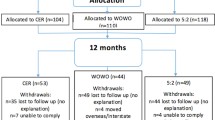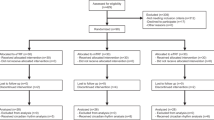Abstract
Background/objectives
This controlled-feeding randomised controlled trial examined free-living appetite and physical activity (PA) on ‘fast’ and ‘feed’ days during intermittent energy restriction (IER), compared to continuous energy restriction (CER).
Subjects/methods
Forty-six women with overweight/obesity (age = 35 ± 10 years, BMI = 29.1 ± 2.3 kg/m2) were randomised to IER (n = 24; alternate fast days at 25% energy requirements and ad libitum feed days) or CER (n = 22; 75% energy requirements daily) to ≥5% weight loss (WL) or up to 12 weeks. Self-reported energy intake (EI; online food record), objectively measured PA (SenseWear Armband) and retrospective daily hunger and food cravings were measured over 7 days at baseline, week 2 and final week. Intent-to-treat analyses were performed using linear mixed models.
Results
Final WL (MΔ = 4.7 [95% confidence interval 4.2, 5.2] kg, 5.9%) did not differ between IER and CER (interaction P = 0.307). During IER, feed-day EI did not differ from baseline and was lower in the final week compared to week 2 (MΔ = 295 [81, 509] kcal, P = 0.004). Daily hunger was greater on fast compared to feed days (MΔ = 15 [10, 21] mm, P < 0.001), but food cravings did not differ. Light PA was lower on fast relative to feed days (MΔ = 18 [2, 34] min/day, P = 0.024), with no other differences in PA. Compared to CER, IER increased hunger and led to smaller improvements in craving control (both interactions P ≤ 0.034).
Conclusions
IER fast days were associated with increased free-living hunger and lower light PA compared to feed days, but had no impact on food cravings or self-reported ad libitum daily EI. IER may be less favourable than CER for the free-living day-to-day control of hunger and food cravings.
This is a preview of subscription content, access via your institution
Access options
Subscribe to this journal
Receive 12 print issues and online access
$259.00 per year
only $21.58 per issue
Buy this article
- Purchase on Springer Link
- Instant access to full article PDF
Prices may be subject to local taxes which are calculated during checkout



Similar content being viewed by others
References
Beaulieu K, Casanova N, Oustric P, Turicchi J, Gibbons C, Hopkins M, et al. Matched weight loss through intermittent or continuous energy restriction does not lead to compensatory increases in appetite and eating behavior in a randomized controlled trial in women with overweight and obesity. J Nutr. 2020;150:623–33. https://doi.org/10.1093/jn/nxz296.
Klempel MC, Bhutani S, Fitzgibbon M, Freels S, Varady KA. Dietary and physical activity adaptations to alternate day modified fasting: implications for optimal weight loss. Nutr J. 2010;9:35.
Varady KA, Bhutani S, Klempel MC, Kroeger CM, Trepanowski JF, Haus JM, et al. Alternate day fasting for weight loss in normal weight and overweight subjects: a randomized controlled trial. Nutr J. 2013;12:146 https://doi.org/10.1186/1475-2891-12-146.
Gibbons C, Finlayson G, Dalton M, Caudwell P, Blundell JE. Metabolic phenotyping guidelines: studying eating behaviour in humans. J Endocrinol. 2014;222:G1–12. https://doi.org/10.1530/joe-14-0020.
Gibbons C, Hopkins M, Beaulieu K, Oustric P, Blundell JE. Issues in measuring and interpreting human appetite (satiety/satiation) and its contribution to obesity. Curr Obes Rep. 2019;8:77–87. https://doi.org/10.1007/s13679-019-00340-6.
Dalton M, Finlayson G, Hill A, Blundell J. Preliminary validation and principal components analysis of the control of eating questionnaire (CoEQ) for the experience of food craving. Eur J Clin Nutr. 2015;69:1313–7. https://doi.org/10.1038/ejcn.2015.57.
Betts JA, Richardson JD, Chowdhury EA, Holman GD, Tsintzas K, Thompson D. The causal role of breakfast in energy balance and health: a randomized controlled trial in lean adults. Am J Clin Nutr. 2014;100:539–47.
Chowdhury EA, Richardson JD, Holman GD, Tsintzas K, Thompson D, Betts JA. The causal role of breakfast in energy balance and health: a randomized controlled trial in obese adults. Am J Clin Nutr. 2016;103:747–56. https://doi.org/10.3945/ajcn.115.122044.
Carter MC, Albar SA, Morris MA, Mulla UZ, Hancock N, Evans CE, et al. Development of a UK online 24-h dietary assessment tool: myfood24. Nutrients. 2015;7:4016–32. https://doi.org/10.3390/nu7064016.
Myers A, Gibbons C, Finlayson G, Blundell JE. Associations among sedentary and active behaviours, body fat and appetite dysregulation: investigating the myth of physical inactivity and obesity. Br J Sports Med. 2017;51:1540–4.
James R, James LJ, Clayton DJ. Anticipation of 24 h severe energy restriction increases energy intake and reduces physical activity energy expenditure in the prior 24 h, in healthy males. Appetite. 2020;152:104719 https://doi.org/10.1016/j.appet.2020.104719.
Trepanowski JF, Kroeger CM, Barnosky A, Klempel MC, Bhutani S, Hoddy KK, et al. Effect of alternate-day fasting on weight loss, weight maintenance, and cardioprotection among metabolically healthy obese adults: a randomized clinical trialeffect of alternate-day fasting among metabolically healthy obese adultseffect of alternate-day fasting among metabolically healthy obese adults. JAMA Intern Med. 2017;177:930–8. 10.1001/jamainternmed.2017.0936.
Harvey J, Howell A, Morris J, Harvie M. Intermittent energy restriction for weight loss: spontaneous reduction of energy intake on unrestricted days. Food Sci Nutr. 2018;6:674–80. https://doi.org/10.1002/fsn3.586.
Thivel D, Finlayson G, Miguet M, Pereira B, Duclos M, Boirie Y, et al. Energy depletion by 24-h fast leads to compensatory appetite responses compared with matched energy depletion by exercise in healthy young males. Br J Nutr. 2018;120:583–92. https://doi.org/10.1017/S0007114518001873.
Oustric P, Beaulieu K, Casanova N, Husson F, Gibbons C, Hopkins M, et al. Exploring the effect of weight loss on food reward at the individual level. Obes Abstr. 2019;1:RFC2.3 https://doi.org/10.1530/obabs.01.RFC2.3.
Sundfør TM, Tonstad S, Svendsen M. Effects of intermittent versus continuous energy restriction for weight loss on diet quality and eating behavior. A randomized trial. Eur J Clin Nutr. 2019;73:1006–14. https://doi.org/10.1038/s41430-018-0370-0.
Bhutani S, Klempel MC, Kroeger CM, Aggour E, Calvo Y, Trepanowski JF, et al. Effect of exercising while fasting on eating behaviors and food intake. J Int Soc Sports Nutr. 2013;10:50 https://doi.org/10.1186/1550-2783-10-50.
Kroeger CM, Trepanowski JF, Klempel MC, Barnosky A, Bhutani S, Gabel K, et al. Eating behavior traits of successful weight losers during 12 months of alternate-day fasting: an exploratory analysis of a randomized controlled trial. Nutr Health. 2018;24:5–10. https://doi.org/10.1177/0260106017753487.
Beaulieu K, Hopkins M, Blundell J, Finlayson G. Homeostatic and non-homeostatic appetite control along the spectrum of physical activity levels: an updated perspective. Physiol Behav. 2018;192:23–9. https://doi.org/10.1016/j.physbeh.2017.12.032.
Sundfor TM, Svendsen M, Tonstad S. Effect of intermittent versus continuous energy restriction on weight loss, maintenance and cardiometabolic risk: a randomized 1-year trial. Nutr, Metab Cardiovascular Dis. 2018;28:698–706. https://doi.org/10.1016/j.numecd.2018.03.009.
Hoddy KK, Marlatt KL, Çetinkaya H, Ravussin E. Intermittent fasting and metabolic health: from religious fast to time-restricted feeding. Obesity. 2020;28:S29–37. https://doi.org/10.1002/oby.22829.
Livingstone MBE, Black AE. Markers of the validity of reported energy intake. J Nutr. 2003;133:895S–920S. https://doi.org/10.1093/jn/133.3.895S.
Acknowledgements
This work was funded by a Research Fellowship awarded to Kristine Beaulieu by the European Society for Clinical Nutrition and Metabolism (ESPEN). We are grateful for in-kind support from LighterLife UK Ltd. The funding sources had no involvement in the conduct of the research and preparation of the article.
Author information
Authors and Affiliations
Corresponding author
Ethics declarations
Conflict of interest
KV is the author of the book “The Every Other Day Diet” published by the Hachette Book Group. The remaining authors declare that they have no conflicts of interest.
Additional information
Publisher’s note Springer Nature remains neutral with regard to jurisdictional claims in published maps and institutional affiliations.
Rights and permissions
About this article
Cite this article
Beaulieu, K., Casanova, N., Oustric, P. et al. An exploratory investigation of the impact of ‘fast’ and ‘feed’ days during intermittent energy restriction on free-living energy balance behaviours and subjective states in women with overweight/obesity. Eur J Clin Nutr 75, 430–437 (2021). https://doi.org/10.1038/s41430-020-00740-1
Received:
Revised:
Accepted:
Published:
Issue Date:
DOI: https://doi.org/10.1038/s41430-020-00740-1



